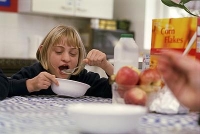Feeding Children with Development Difficulties course for Paediatricians


This session explores the difficulty children with neurological disabilities commonly encounter with feeding, together with associated problems that can result in growth failure and malnutrition-related multi-system complications. It covers assessment and management, which often involves a range of professionals including a dietitian, occupational therapist, speech and language therapist, paediatrician and GP.
Learning Objectives
By the end of this session you will be able to:
- Identify the types of problems children with developmental difficulties may have with feeding and how this in turn may adversely affect nutritional status
- Describe the commonly used interventions to address feeding problems, and the role of tube feeding
- Explain some of the practical aspects of gastrostomy insertion and management
Nutritional problems are very common in children with developmental delay and neurological disability for a variety of different reasons. Maintaining good nutrition can help children to feel well and maximise their potential.
Prerequisites
Before commencing this session you should complete:
- Completed session: 08 Growth and Nutrition/08_09 Faltering Growth
Dr John Puntis qualified from the University of Southampton medical school in 1977 and then trained in Birmingham as a paediatrician before taking up a consultant post in Leeds as Director of Neonatal Services in 1990. With a research interest in clinical nutrition, he developed a regional gastroenterology service and now works full time in this specialty. Together with nursing, dietetic and pharmacy colleagues within a multidisciplinary nutrition support team (NST), his work involves managing children with a variety of congenital or acquired gastrointestinal diseases. The NST provides advice and support throughout the Leeds Children’s Hospital for patients with a wide range of nutritional problems, including those needing long-term enteral tube feeding and parenteral nutrition, as inpatients or at home.

- Fantastic Twos - Common Behavioural and Emotional ...
- Posted By eIntegrity Healthcare e-Learning
- Posted Date: 2025-02-21
- Location:Online
- This session provides an overview of the theory behind the emotional development of the pre-school c...
- Communication Impairments Part 4: Autistic Spectru...
- Posted By eIntegrity Healthcare e-Learning
- Posted Date: 2025-02-21
- Location:Online
- This session is the last of four that looks at different speech, language and communication impairme...
- Acne Course for Paediatrics professionals
- Posted By eIntegrity Healthcare e-Learning
- Posted Date: 2025-02-21
- Location:Online
- This session is intended to give the reader a brief overview of the epidemiology, pathophysiology, c...
- Assessment and Diagnosis of CFS/ME in Adolescence ...
- Posted By eIntegrity Healthcare e-Learning
- Posted Date: 2025-02-21
- Location:Online
- This session introduces the learner to chronic fatigue syndrome/myalgic encephalomyelitis (CFS/ME) a...
- Managing CFS/ME in Adolescence for Paediatrics pro...
- Posted By eIntegrity Healthcare e-Learning
- Posted Date: 2025-02-21
- Location:Online
- This session introduces the learner to the management of chronic fatigue syndrome/myalgic encephalom...








